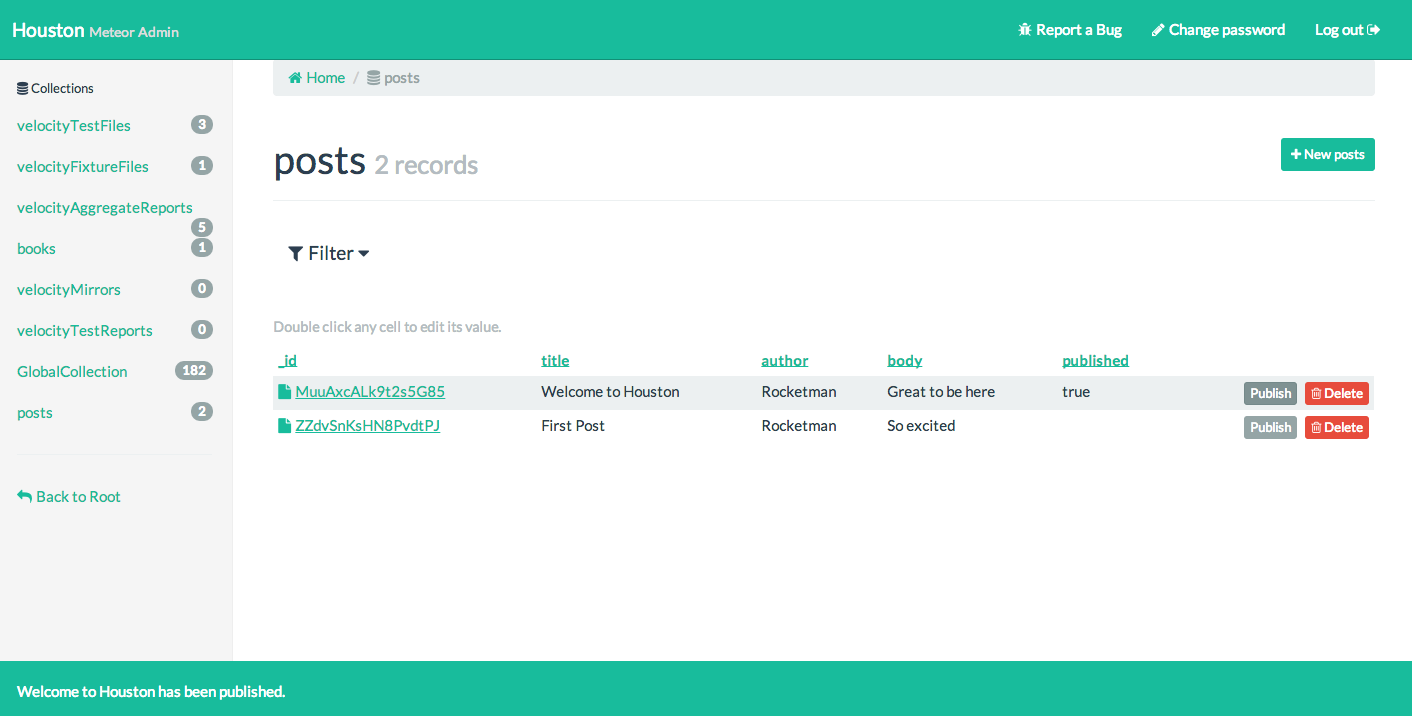Houston is a zero-config Meteor Admin, modeled after Django Admin, intended as a simple way for developers to give end-users (or themselves) an easy way to view and manipulate their app's data. Watch a video demo from Meteor Devshop or read below for more.
Houston is no longer being maintained. Interested in the story behind Houston? Check out Confessions of a Deadbeat Open Source Maintainer.
meteor add houston:admin
Once installed, navigate to /admin to set up your admin account. You can either create a new user to act as Houston's Admin, or upgrade an existing user into an admin.
Houston will auto-discover your collections by exploring the top-level (root) namespace on the server for collections. If your collections are not on the global namespace, see Customizing Houston
Collection view includes support for
- deleting and creating documents
- inline editing (double-click on a cell)
- filtering and sorting by names
- support for nested objects
- (limited, mostly read-only) support for arrays
Declare custom actions for specific collections using a Meteor.methods-like syntax.
Houston.methods("Posts", {
"Publish": function (post) {
Posts.update(post._id, {$set: {published: true}});
return post.name + " published successfully.";
}
});Call Houston.methods for every collection you want to add custom actions for. The first argument is the collection name (or the Mongo.Collection itself), and the second argument is a {method_name: function} dictionary, as in Meteor.methods.
Each Houston.methods method should return a string, which will be display to the user as the success message. If you throw an exception, the exception.message will be shown to the user (Internal Server Error by default).
The actions will be visible as buttons in both the collection and document view.
Often, when delivering an admin interface for an end user, you may want to have more functionality than simply editing the models. Houston provides for adding custom functionality in two ways: (1) Templates, which live in their own section of the Houston UI, or (2) Links, which are easily available from the Houston interface and point to wherever you need them to. You can add several object arguments to menu and it will process them as single menu items.
Houston.menu({
'type': 'template',
'use': 'my_analytics_template',
'title': 'Analytics'
}, {...}, {...});Houston.menu({
'type': 'link',
'use': 'http://google.com',
'title': 'Google',
'target': 'blank'
});If Houston didn't find your collection automatically, you can always add it manually on the server via
Houston.add_collection(collection);The users collection is hidden by default. If you want to access your users in Houston and/or be able to add houston admins just:
Houston.add_collection(Meteor.users);
Houston.add_collection(Houston._admins);You can also Houston.hide_collection(collection), though this is not as well-tested.
By default, Houston is hosted on /admin, but you're welcome to change this by setting public.houston_root_route in Meteor.settings (see the docs).
By default, Houston displays 20 items per page (infinite scroll is currently buggy - pull requests most welcome).
If you need to see more items per page and filters don't do the trick, set "public.houston_documents_per_page" in your Meteor.settings.
Add a settings.json file to your project. Something like:
echo {\"public\": {\"houston_root_route\": \"/your_fancy_route\", \"houston_documents_per_page\": 9001}} > settings.jsonmeteor --settings=settings.json
meteor deploy <site> --settings settings.json
Tests are currently based on a test app and Velocity. run with ./run-tests.sh
Test coverage is currently rather meager. Pull requests & contributors welcome. Be the hero you always knew you could be.
- Router: As of v1.0, Houston is compatible with both IronRouter and Router-less solutions that don't conflict with IronRouter. Let us know if that's not true for you.
- Accounts: Houston piggybacks on top of Meteor Accounts.
- CSS: Houston uses Bootstrap, but makes an effort to avoid having its CSS interfere with yours.
- Meteor: As of Houston 1.2.0, Houston requires Meteor 1.0 or newer.
###Current State The 1.3 release should fully support Meteor 1.0. We intend to support it. Please send in feature requests, bug reports, and contribute.
- Test coverage (first priority, probably before adding any additional features)
- Custom admin roles: let package users write their own allow/deny scripts for admin types
- Allow package user to add custom CSS per collection / per view
- Full support for Arrays / all sorts of complicated nested documents
- Log of all actions done on Houston and (though this is tough) ability to roll back actions.
- Get arbitrary mongo filters to work.
- Proper Meteor/IronRouter support for mounting Houston to /admin (to replace the current CSS/router hackery).
Houston was originally created during the Summer 2013 Meteor Hackathon by @gterrono, @alexeymk, @yefim and @ceasar_bautista.





